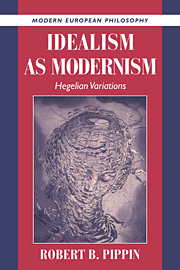Book contents
- Frontmatter
- Contents
- Acknowledgments
- Abbreviations
- Dedication
- 1 Introduction: Hegelianism?
- Part One The Original Options: Kant Versus Hegel
- Part Two Critical Modernism
- Part Three Greeks, Germans, and Moderns
- Part Four Narrating Modernity
- Part Five Modernism and Nihilism
- Part Six Heidegger's “Cuhnination”
- Part Seven Hegelianism
- 17 Hegel's Ethical Rationalism
- Name Index
- Subject Index
17 - Hegel's Ethical Rationalism
Published online by Cambridge University Press: 05 June 2012
- Frontmatter
- Contents
- Acknowledgments
- Abbreviations
- Dedication
- 1 Introduction: Hegelianism?
- Part One The Original Options: Kant Versus Hegel
- Part Two Critical Modernism
- Part Three Greeks, Germans, and Moderns
- Part Four Narrating Modernity
- Part Five Modernism and Nihilism
- Part Six Heidegger's “Cuhnination”
- Part Seven Hegelianism
- 17 Hegel's Ethical Rationalism
- Name Index
- Subject Index
Summary
Hegel claimed to have developed and defended a unique category of ethical assessment – “Sittlichkeit” or “ethical life” (Sittlichkeit might also be translated simply as “customariness”). Although he shares with many other modern philosophers the view that to live righteously is to live freely, and with some classical thinkers the idea that the worthiest life involves an active engagement with others, Hegel adds to both positions the claim that to live freely is to participate in certain modern institutions, to be a social and political being of a certain sort.
Hegel's reasons for making this claim are complex, and many involve difficult issues in what he considered the logic of individuality and universality. But, like Rousseau and Kant, he also linked the possibility of free agency with a kind of practical rationality and based many of the things he wanted to say about the “priority of ethical life” on considerations arising from an analysis of the possibility of such rationality. Or so I want to claim in what follows.
However, appreciating Hegel's position on ethical life has been impeded, I believe, by two familiar characterizations of his case. First, the nature of Hegel's ethical rationalism has been obscured by his own spirited critique of moral rigorism, dualism of all kinds, the general Zemrissenheit of modern life, and so forth.
- Type
- Chapter
- Information
- Idealism as ModernismHegelian Variations, pp. 417 - 450Publisher: Cambridge University PressPrint publication year: 1997
- 1
- Cited by



